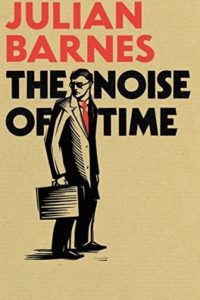Not all terrific books about Russian topics have to be gigantic. In The Noise of Time, Julian Barnes sketches the life of Dmitri Shostakovich in fewer than 200 pages, drawing mainly on three periods in the composer’s life while using those to look back on other times. In the first, it is 1937, the height of Stalin’s purges. Shostakovich’s patron, a marshal of the Soviet Union, has fallen into disgrace and been shot. Pravda publishes a major article criticizing his music. Shostakovich thinks it is only a matter of time before he is taken in by the secret police, and he takes to spending each night by the lift in his apartment building, suitcase already in hand.
Barnes captures the terror of waiting, of knowing the ominous signs and being sure that a car will come in the depth of night but not knowing which night. He also captures the menace of a Conversation with Power, and shows how people brought in were not only expected to confess, but to implicate many others, thus helping the police fulfill their planned production of enemies of the people.
He escapes being shot, of course; as soon as Barnes gives his protagonist’s full name, a reader knows he will not be killed in the purges. But that article in Pravda echoes through his life. Shostakovich never writes another opera. Critics interpret his next symphony as a Soviet composer responding to justified criticism, and he quite consciously lets the interpretation stand.
He allowed them to stand because they protected his music. Let Power have the words, because words cannot stain music. Music escapes from words: that is its purpose, and its majesty.
The phrase also permitted those with asses’ ears to hear in his symphony what they wanted to hear. They missed the screeching irony of the final movement, that mockery of triumph. They heard only triumph itself, some loyal endorsement of Soviet music, Soviet musicology, of life under the sun of Stalin’s constitution. He had ended the symphony fortissimo and in the major. What if he had ended it pianissimo and in the minor? On such things might a life — might several lives — turn. (pp. 57–58)
Shostakovich is not shot, but he is in disfavor, and nobody wants to run the risk of playing his music. Barnes shows the kind of limbo a person could fall into in Soviet times, even, or especially, someone as high up in society as Shostakovich. The second and third sections of the book follow other, less immediately deadly, perils. In the second, Shostakovich is asked to join a delegation of Soviet representatives to an international peace conference in New York. He demurs, hoping to retain some personal integrity and not to have to parade himself before the world. Power is not so easily deferred. It insists. When Shostakovich plays his final trump, saying that his music is played and admired in the West but is prohibited at home and how should he respond when asked about it, Power replies that it had never given such an order, that there had been a mistake and that there will be a reprimand. And so his music returned to Soviet concert halls. And he went to the West, and duly recited what Power required him to say.
While the relationship between art and politics, not just in dictatorships, forms a major theme of The Noise of Time, Barnes examines much more of Shostakovich’s life in this slender volume. The relationship between family and work, where and how he found love, and how all the people involved lived with those developments — all of these are shown in the short movements, sometimes just a sentence or three, seldom more than a page and a half, that comprise the book.
This is a mature writer’s work, looking back on life as a whole, with all of its contradictions, complications, and compromises. It’s very different from The Porcupine, Barnes’ other book that looks at the legacy of Communism. That one revolves around the post-1989 trial of a newly deposed General Secretary, an unrepentant son of a bitch who tells everyone involved how worthless he thinks liberalism and the rule of law are; he takes great pleasure in reminding his opponents of their, or their parents’, compromises under the previous regime. The Noise of Time looks at those compromises from the inside, in the person of an undeniably great artist, how people get along in both their public and private lives. Shostakovich is well aware of his shortcomings, and peculiarities; Barnes portrays both with unsentimental sympathy. This is a terrific book about life, and Soviet life, and how much of it comes full circle in the end.

